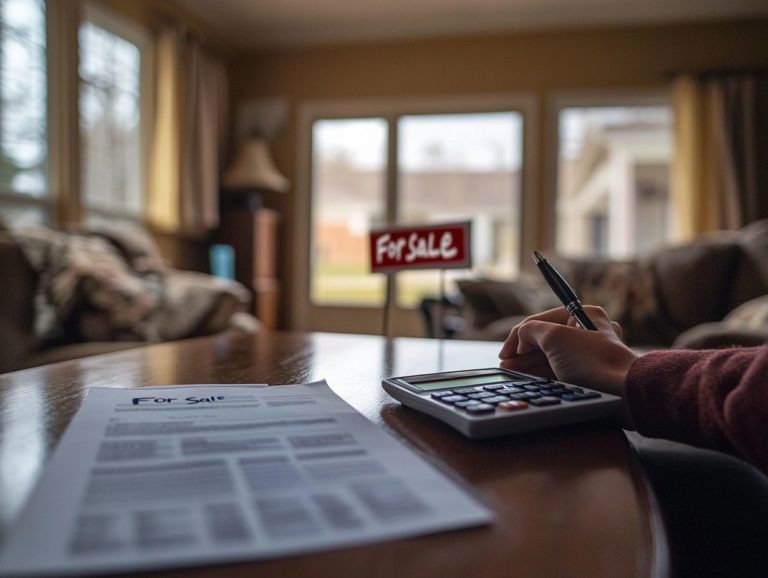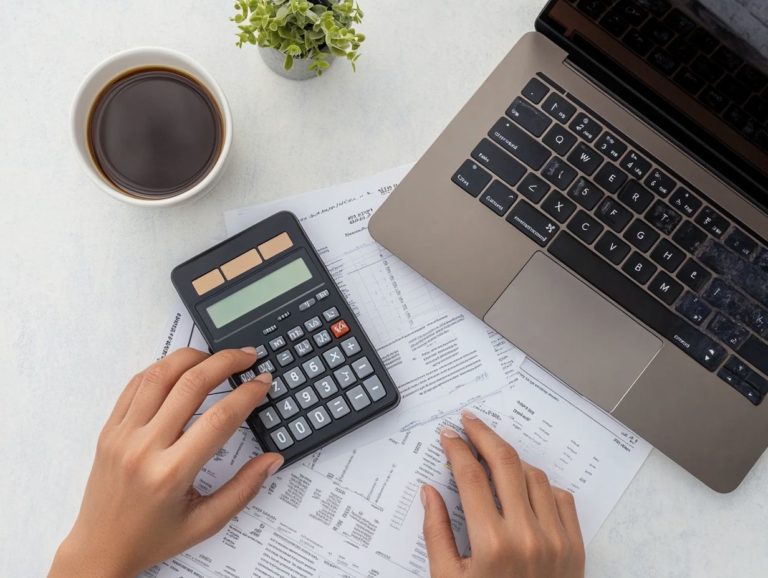5 Signs You Are Ready to Buy a Home
Considering swapping your rental for a space to truly call your own? Embarking on the journey of homeownership can be incredibly rewarding, but recognizing when you re genuinely ready is essential.
Discover five key signs that show you re ready for homeownership! This article covers everything from your financial stability to your grasp of the real estate market.
Dive in now to uncover the exciting benefits and possible challenges of owning your home!
Contents
- Key Takeaways:
- 1. You Have a Stable Income and Good Credit Score
- 2. You Have Saved Enough for a Down Payment and Closing Costs
- 3. You Are Tired of Renting and Ready to Settle Down
- 4. You Have a Good Understanding of the Real Estate Market
- 5. You Have Considered All the Costs Involved in Homeownership
- What Are the Benefits of Owning a Home?
- Frequently Asked Questions
- What are the 5 signs that I am ready to buy a home?
- Do I need a stable income to be ready to buy a home?
- How much savings do I need to be ready to buy a home?
- Why is having a good credit score important when buying a home?
- How long should I plan on staying in the same place before buying a home?
- What responsibilities come with homeownership?
Key Takeaways:

A steady income and good credit score show you’re ready to buy a home. Saving enough for a down payment and closing costs demonstrates your preparedness for the financial responsibilities of homeownership. If you’re considering the transition, be aware of 5 signs your home needs a professional inspection, as a desire to settle down and stop renting indicates you are emotionally ready to buy a home.
1. You Have a Stable Income and Good Credit Score
Having a stable income and a solid credit score is vital when you re understanding the financial aspects of buying a house. These factors significantly influence your ability to secure favorable mortgage payments and manage the preapproval process with lenders.
A steady income reflects your monthly financial security and reassures lenders that you can consistently meet repayment obligations. For those aspiring to become homeowners, maintaining a good credit score is equally important; it often unlocks access to the best mortgage rates.
A higher credit score signals to lenders that you pose a lower risk. This can translate into reduced interest rates and more favorable terms, saving you money in the long run.
Both income stability and credit health play crucial roles in determining your debt-to-income ratio, which is a key metric evaluated during the loan approval process. Simply put, this ratio compares your monthly debt payments to your gross income.
By taking proactive steps like making timely bill payments and minimizing outstanding debts you can boost your credit score. Consistent employment or exploring additional income streams provides the financial stability necessary for successful homeownership.
2. You Have Saved Enough for a Down Payment and Closing Costs
Saving enough for a down payment and closing costs is a crucial step on your journey to homeownership. It establishes a solid foundation for your financial security and future mortgage obligations.
The amount needed for a down payment can vary based on the mortgage type you select. For instance, FHA loans often allow you to make a down payment as low as 3.5%, while VA loans offer zero down payment for eligible veterans.
The size of your down payment can significantly impact your monthly mortgage payments. Generally, a larger down payment leads to lower monthly payments and less interest over the life of the loan.
To effectively save for this milestone, set a specific savings goal, open a dedicated savings account, and employ budgeting strategies like automating your transfers each month.
3. You Are Tired of Renting and Ready to Settle Down
If you re weary of the rental cycle and craving stability, deciding to pursue homeownership marks a significant transition in your life. This choice promises benefits that extend beyond just having a permanent residence.
For many, this shift represents an opportunity to invest in a tangible asset that can appreciate over time. Homeownership cultivates a sense of community, enabling you to build lasting relationships with neighbors and engage in local events.
Financially, owning a home often translates into substantial long-term savings, as your monthly mortgage payments contribute to building equity rather than padding someone else’s pockets.
The emotional satisfaction of having a place you can truly call your own provides a profound sense of security and belonging that renting often lacks.
4. You Have a Good Understanding of the Real Estate Market

Understanding the real estate market is crucial for making informed decisions. It gives you the power to evaluate housing affordability, navigate property taxes, and pinpoint the ideal moment to make a purchase.
By diving into various data sources, such as CoreLogic reports and local market analyses, you can uncover valuable insights into pricing trends and inventory levels. The overall health of the market is also important.
Seasonality plays a significant role in influencing home prices and demand. Recognizing patterns from historical data can guide you on when to step into the market. Key indicators, including interest rates and employment statistics, significantly shape the landscape. Interpreting these fluctuations is essential.
For example, while a rise in interest rates might initially scare off buyers, it could also lead to lower prices, presenting enticing opportunities for the discerning purchaser.
5. You Have Considered All the Costs Involved in Homeownership
Considering all the costs associated with homeownership is essential for ensuring you re financially prepared for the responsibilities that come with owning a home. These expenses go beyond just your monthly mortgage payments.
Homeownership involves a complex financial tapestry that includes homeowners insurance, property taxes, and regular home repairs. As a future homeowner, it s crucial to engage in thorough budgeting and financial planning.
Understanding these costs helps you avoid unexpected financial strain. This knowledge allows you to allocate your resources better and fosters a secure and enjoyable home life.
What Are the Benefits of Owning a Home?
Owning a home offers you a wealth of benefits, from building home equity (the value of your home minus what you owe on it) to enjoying financial stability.
You also enjoy tax benefits that can ease your financial load, including deductions on mortgage interest and property taxes.
Unlike renting, where your monthly payments can swing unpredictably, a fixed-rate mortgage provides you with peace of mind through consistent payments. This stability allows for better budget management.
As your property appreciates over time, it transforms into a long-term investment with the potential for substantial returns. Homeownership is more than just having a roof over your head; it s a smart financial move!
What Are the Potential Drawbacks of Homeownership?
Homeownership certainly has its perks, but it also brings potential drawbacks that you should be aware of, such as ongoing maintenance costs, property taxes, and financial decisions that could impact your overall security.
These challenges often emerge when you least expect them. They can transform what should be a fulfilling experience into a source of stress. For many, the thought of sudden repairs like a leaky roof or a malfunctioning HVAC system can be daunting, potentially draining your savings in a flash.
The responsibilities associated with maintaining a home can feel overwhelming. Regular upkeep demands both time and resources. To navigate these challenges effectively, consider establishing a dedicated maintenance fund. This proactive approach can help you brace for unforeseen expenses.
Research property tax assessments and appeal them when necessary to protect your investment.
How Can You Determine If You Are Financially Ready to Buy a Home?

Determining your financial readiness to buy a home requires careful evaluation of several critical factors. This includes your credit score, debt-to-income ratio, and your ability to manage ongoing mortgage payments while following the 5 steps to a successful home purchase to ensure your financial security.
Start by calculating your debt-to-income ratio. This percentage indicates how much of your monthly income goes toward paying debts, including your future mortgage. Next, consider how your credit score affects the mortgage rates available to you it can significantly impact your purchasing power.
Generally, higher credit scores lead to lower interest rates, making the dream of homeownership more attainable. Also, check your savings for down payments and closing fees. This assessment provides a realistic view of what you can afford without compromising your financial stability.
What Are the Steps Involved in the Homebuying Process?
Going through the homebuying process involves several critical steps that you should approach with care and strategy.
Begin by obtaining preapproval from mortgage lenders. This step clarifies your budget constraints and bolsters your credibility when negotiating with sellers. Once you have that preapproval in hand, it’s time to dive into the house-hunting phase.
Seek out properties that align with your needs and financial limits. While this stage can feel overwhelming, partnering with a knowledgeable realtor can offer you invaluable insights into neighborhoods and the current market landscape.
When you find a property that meets your criteria, crafting a competitive offer becomes essential. This often determines the success of your purchase. With effective negotiation and guidance from real estate professionals, you’ll quickly step into the exciting world of homeownership!
What Are the Different Types of Mortgages Available?
Understanding the various types of mortgages like FHA loans, VA loans, and Jumbo loans is crucial for making informed financial decisions when dealing with mortgage lenders.
Each option presents its own set of eligibility criteria and distinct advantages that could align perfectly with your financial situation. For instance, FHA loans are often the go-to for first-time buyers due to their lower down payment requirements.
Conversely, VA loans provide exceptional benefits for veterans, including no down payment and the absence of private mortgage insurance. If you’re looking for larger sums, Jumbo loans are designed for you, typically requiring stricter credit standards and associated with higher costs.
It s essential to explore how these mortgage types can affect your monthly payments and overall costs. This knowledge will play a significant role in your long-term financial well-being.
How Can You Ensure You Are Making a Wise Investment in a Home?
To ensure you’re making a wise investment in a home, it s essential to conduct thorough research.
Understanding financial decisions related to property taxes and potential homeowners association fees, as well as assessing future market trends, will set you up for success.
Taking the time to evaluate neighborhoods can significantly impact both your quality of life and the resale value of your property. By investigating local amenities, school ratings, and crime statistics, you can gain a clearer picture of the area’s suitability for your lifestyle.
Grasping property values not only aids you in negotiating a fair price but also helps you forecast future appreciation, allowing for informed decisions.
A meticulous approach to due diligence gives you the power to secure not just a house, but a sound long-term investment that aligns with your goals and aspirations.
If you’re serious about your investment, consider seeking professional advice or consulting with real estate agents.
Frequently Asked Questions

What are the 5 signs that I am ready to buy a home?
Here are five signs you’re ready to buy a home: stable income, enough savings for a down payment and closing costs, a good credit score, commitment to stay in one place for a few years, and understanding homeownership responsibilities.
Do I need a stable income to be ready to buy a home?
Yes, a stable income is crucial. It shows you can consistently make mortgage payments and cover home expenses.
How much savings do I need to be ready to buy a home?
Aim to save at least 20% for the down payment, plus funds for closing costs and emergencies. This indicates you are financially ready for homeownership costs.
Why is having a good credit score important when buying a home?
A good credit score reflects your financial responsibility. It can help you secure a better mortgage interest rate and save money over time.
How long should I plan on staying in the same place before buying a home?
It s wise to stay in one location for 3-5 years before buying. This gives you time to build equity and possibly profit when you sell.
What responsibilities come with homeownership?
As a homeowner, you must maintain your property and pay property taxes and insurance. You also have the freedom to improve your home, but that comes with costs you need to manage.






